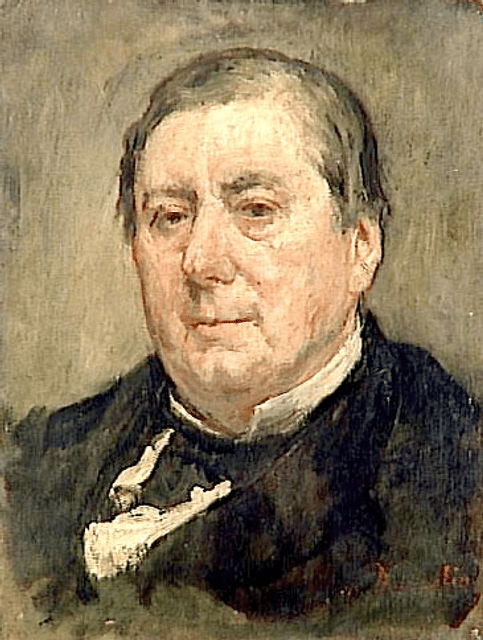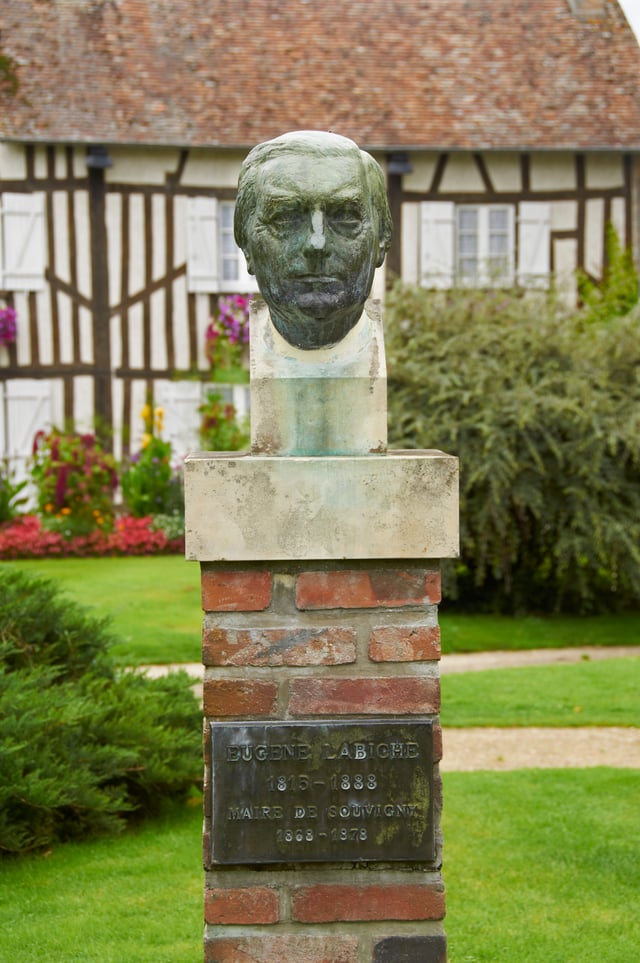Eugène Marin Labiche

Eugène Marin Labiche

Eugène Marin Labiche | |
|---|---|
| Born | (1815-05-05)5 May 1815 Paris, Kingdom of France |
| Died | 23 January 1888(1888-01-23)(aged 72) Paris, France |
| Resting place | Cimetière de Montmartre |
| Genre | Dramaturgy |
| Notable works | The Italian Straw Hat |
Eugène Marin Labiche (5 May 1815 – 23 January 1888) was a French dramatist, perhaps best known for his 1851 farce written with Marc-Michel, The Italian Straw Hat, which has since been adapted many times to stage and screen.
Eugène Marin Labiche | |
|---|---|
| Born | (1815-05-05)5 May 1815 Paris, Kingdom of France |
| Died | 23 January 1888(1888-01-23)(aged 72) Paris, France |
| Resting place | Cimetière de Montmartre |
| Genre | Dramaturgy |
| Notable works | The Italian Straw Hat |
Early life
He was born into a bourgeois family and studied law.[1] At the age of twenty, he contributed a short story to Chérubin magazine, entitled "Les plus belles sont les plus fausses" ("The most beautiful are the most fake/false"). A few others followed, but failed to catch the attention of the public.
Career

Statue in Souvigny-en-Sologne, France
Labiche tried his hand at dramatic criticism in the Revue des théâtres and in 1838, wrote and premiered two plays.
The small Théâtre du Pantheon produced, to some popular success, his drama L'Avocat Loubet, while a vaudeville, Monsieur de Coyllin, ou l'homme infiniment poli (written in collaboration with Marc-Michel and performed at the Palais Royal) introduced a provincial actor who was to become and to remain a great Parisian favourite, the famous comedian Grassot.
In the same year, Labiche, still doubtful about his true vocation, published a romance called La Clé des champs. According to Léon Halévy, Labiche's publisher went bankrupt soon after the novel was out: "A lucky misadventure, for this timely warning of Destiny sent him back to the stage, where a career of success was awaiting him." There was yet another obstacle in the way. When he married, Labiche solemnly promised his wife's parents that he would renounce a profession then considered incompatible with moral regularity and domestic happiness. A year later, his wife released him from his vow, and Labiche recalled the incident when he dedicated the first edition of his complete works to her.
In conjunction with Varin, Marc-Michel, Louis François Clairville, Philippe François Dumanoir, and others, he contributed comic plays interspersed with couplets to various Paris theatres. He was considered a successful but undistinguished vaudevillist, until he paired with Marc-Michel to create the five-act farce, Un Chapeau de paille d'Italie (The Italian Straw Hat), which turned out to be a major success upon its opening in August 1851. It is an accomplished specimen of the French imbroglio-style play, in which someone is in search of something, but does not find it till five minutes before the curtain falls. For the next twenty-five years, he continued to write successful comedies and vaudevilles, all basically constructed on the same plan and containing a dose of comic observation and good sense. "Of all the subjects," he said, "which offered themselves to me, I have selected the bourgeois. Essentially mediocre in his vices and in his virtues, he stands half-way between the hero and the scoundrel, between the saint and the profligate."
During the second period of his career Labiche collaborated with Alfred Delacour, Adolphe Choler, and others. Emile Augier said: "The distinctive qualities which secured a lasting vogue for the plays of Labiche are to be found in all the comedies written by him with different collaborators, and are conspicuously absent from those which they wrote without him." Even more important was his professional relationship with actor Jean Marie Geoffroy, who specialized in Labiche's pompous and fussy bourgeois characters. Many of Labiche's roles were written specifically for Geoffroy. Célimare le bien-aimé (1863), Le Voyage de M. Perrichon (1860), La Grammaire, Un Pied dans le crime, La Cagnotte (1864), were some of Labiche's most important plays.
Retirement and death
In 1877, he ended his connection with the stage, and retired to his rural property in Sologne. There, he devoted his energies to supervising agricultural work and to reclaiming land and marshes. His lifelong friend, Émile Augier, visited him there, and strongly advised Labiche to publish a collected and revised edition of his works. Though Labiche was initially reluctant, he issued, during 1878 and 1879, his comic plays in ten volumes, which were enthusiastically received. Many people had assumed that Labiche's plays owed their popularity to the actors who had appeared in them, but, upon reading the plays, they realized that their success was due to the writing itself, with its humor and skilled characterization. Due to this re-evaluation of Labiche's writing, he was elected to the Académie française in 1880.
Labiche died in Paris and was buried in the Cimetière de Montmartre.
Appreciation
Some admirers have considered Labiche the equal of Molière; his plays are more complex and less coarse than many other examples of French farce. Love is practically absent from his theatre. In none of his plays did he ever venture into the depths of feminine psychology, and womankind is only represented by pretentious old maids and silly young ladies. He ridiculed marriage, but in a friendly and good-natured manner that always left a door open to repentance and timely amendment.
Plays
1851 : The Italian Straw Hat (Un chapeau de paille d'Italie)
1852 : Maman Sabouleux
1857 : L'Affaire de la rue de Lourcine
1860 : Les Deux Timides
1860 : Le Voyage de monsieur Perrichon
1861 : La Poudre aux yeux
1864 : La Cagnotte
1875 : Les Trente Millions de Gladiator
Filmography
L'Affaire de la rue de Lourcine, directed by Henri Diamant-Berger (France, 1923, based on the play L'Affaire de la rue de Lourcine)
La Fille bien gardée, directed by Louis Feuillade (France, 1924, based on the play La Fille bien gardée)
The Italian Straw Hat, directed by René Clair (France, 1928, based on the play The Italian Straw Hat)
Two Timid Souls, directed by René Clair (France, 1928, based on the play Les Deux Timides)
L'Affaire de la rue de Lourcine, directed by Marcel Dumont (France, 1932, short film, based on the play L'Affaire de la rue de Lourcine)
Le Voyage de monsieur Perrichon, directed by Jean Tarride (France, 1934, based on the play Le Voyage de monsieur Perrichon)
The Leghorn Hat, directed by Wolfgang Liebeneiner (Germany, 1939, based on the play The Italian Straw Hat)
Ma tante dictateur, directed by René Pujol (France, 1939, based on the play Maman Sabouleux)
Un chapeau de paille d'Italie, directed by Maurice Cammage (France, 1941, based on the play The Italian Straw Hat)
Two Timid Souls, directed by Yves Allégret (France, 1943, based on the play Les Deux Timides)
Il viaggio del signor Perrichon, directed by Paolo Moffa (Italy, 1943, based on the play Le Voyage de monsieur Perrichon)
Die tolle Susanne, directed by Géza von Bolváry (Germany, 1945, based on the play Les Trente Millions de Gladiator), unfinished film
My Niece Susanne, directed by Wolfgang Liebeneiner (West Germany, 1950, based on the play Les Trente Millions de Gladiator)
Trois jours de bringue à Paris, directed by Émile Couzinet (France, 1954, based on the play La Cagnotte)
Matrimonios juveniles, directed by José Díaz Morales (Mexico, 1961, based on the play The Italian Straw Hat)
Straw Hat, directed by Oldřich Lipský (Czechoslovakia, 1971, based on the play The Italian Straw Hat)